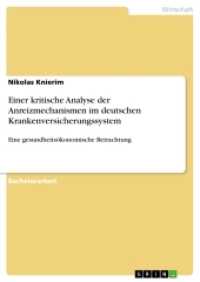- ホーム
- > 洋書
- > 英文書
- > Religion / Ethics
基本説明
New in paperback. Hardcover was published in 2008.
Full Description
Argues that the rights of women in Muslim society are based on the preserved cultural standards of elites, not the ethical philosophy of the Quran.
Contesting Justice examines the development of the laws and practices governing the status of women in Muslim society, particularly in terms of marriage, polygamy, inheritance, and property rights. Ahmed E. Souaiaia argues that such laws were not methodically derived from legal sources but rather are the preserved understanding and practices of the early ruling elite. Based on his quantitative, linguistic, and normative analyses of Quranic texts-and contrary to the established practice-the author shows that these texts sanction only monogamous marriages, guarantee only female heirs' shares, and do not prescribe an inheritance principle that awards males twice the shares of females. He critically explores the way religion is developed and then is transformed into a social control mechanism that transcends legal reform, gender-sensitive education, or radical modernization. To ameliorate the legal, political, and economic status of women in the Islamic world, Souaiaia recommends the strengthening of civil society institutions that will challenge wealth-engendered majoritism, curtail society-manufactured conformity, and bridle the absolute power of the state.
Contents
Illustrations
Preface
Acknowledgments
Introduction
1. Legal Absolutism and Ethical Relativism
To Know or Not to Know: The Basis of Acts
Cognition through Models and Paradigms
2. The Domain of Ethics and the Law
Chronology of Islamic Thought
Ethics, Morality, and the Law
Determining God's Position
Core and Marginal Sanctions
Emotion and Law in the Qur'anic Discourse
Threats, Incentives, and Piety
Crime and Punishment
3. Basis for the Practice of Polygamy
On the Methodological and Historical Assumptions
Methodological and Disciplinary Precedence
Polygamy in the Historical Context
The Philology of Polygamy
4. Women in Islamic Law of Inheritance
The Qur'anic and Interpretive Dichotomy
The Legal and Exegetical Treatment of the Verses on Inheritance
Women, Justice, and Interpretation: The Principle of `Awl
Explicitness, Consensus, and Interpretation
Shares and Heirs in the Comparative Context
Shares and Heirs per Blind Survey
Description of Data Collection
Explanation and Interpretation of Data
5. Women in Modern Times
Discussion
Linking Polygamy and Inheritance: Disadvantaging Women by the Numbers
Discussing the Status of Women
Other Contested Perspectives
Bespoke Justice versus Tyranny of Majoritism
Inclusion and Exclusion of Women
Conclusion
Appendix A
Timeline of Scholars and Major Figures
Appendix B
Glossary of Key Arabic Terms and Their Derivatives
Notes
Bibliography
Index








